What If? 22 Crazy Hypothetical Questions (and their Answers)
What would happen if you fell into a black hole?
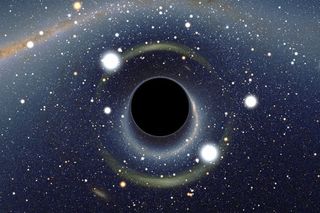
If you were to take a step into a small black hole, your body would most closely resemble toothpaste being extruded out of the tube. Tidal forces are so strong at a black hole's threshold (called the "event horizon") that they would stretch your body into a string of atoms as you fell into the abyss. But if you fell into a somewhat larger black hole with less extreme tides, you could maintain your internal structure. Einstein's theory of time dilation suggests that if you looked forward toward the black hole's center, you'd see every object that has fallen into it in the past. Behind you, you'd see everything that will ever fall into it in the future. [Learn more about life at the edge of a black hole]
What if another advanced species existed?

If Earth had another species as tech-savvy as us, we would probably be locked in a constant battle for supremacy. If after hundreds of thousands of years, no one won, we would start to adapt to require separate resources, and would come to ignore one another. [Find out what they'd look like.]
What if Earth were twice as big?
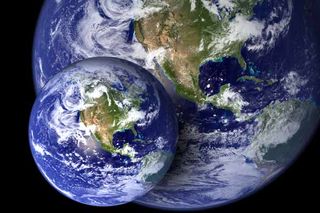
If Earth's diameter were doubled to about 16,000 miles, the planet's mass would increase eight times, and the force of gravity on the planet would be twice as strong. All the plants and animals that currently exist would collapse under their own doubled weight, and new, stockier species would arise. [Get the full explanation]
What if a giant asteroid hadn't wiped out the dinosaurs?
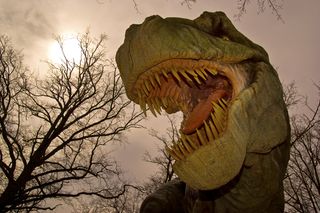
If that asteroid hadn't struck, the dinosaurs would in all likelihood still rule the Earth. After all, dinos dominated for 160 million years prior to the Earth-shattering event. Researchers have speculated that intelligent "dinosauroids" might have evolved in humanity's place, based on the relatively large brain size of late-emerging trodontid species, which were bird-like predators. [Get the full explanation]
What if everyone on Earth jumped at once?

If all 7 billion of us crowded close together and jumped, we would make the Earth move just one-hundredth of the radius of a single atom per second. When we landed, Earth would move back in place, like a spring. [Get the full explanation]
What if the moon had never formed?
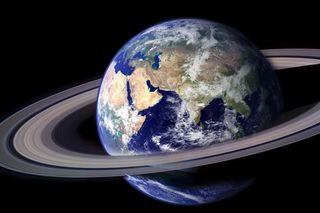
Huge tides generated by the moon which orbited much closer to Earth when it formed washed the chemical building blocks for life from land into the oceans and helped stir up the primordial soup. Without it, life may never have arisen, or living things would have very different behavioral patterns to cope with the six-hour day and extreme climate changes that would exist on a moonless Earth. [Get the full explanation]
What if humans were twice as intelligent?

If humans were twice as intelligent as we are now, experts think we would be more fulfilled on an individual scale, as well as healthier, better looking and less religious. But people would still have a diverse range of personalities, and so society as a whole might be just as conflicted as it is today. [Get the full explanation]
Sign up for the Live Science daily newsletter now
Get the world’s most fascinating discoveries delivered straight to your inbox.
What if all the cats in the world suddenly died?

Cats may seem ineffectual, but they're in fact vital members of the global ecosystem. From studies that have looked at the effects of removing cats from small islands, we know that, without them, Earth would quickly become overrun by rodents. Mice and rats would probably destroy grain supplies, spread disease, and wipe out ground-nesting birds. [Get the full explanation]
What if we were closer to the Milky Way's edge?

Though there is just one-third the quantity of metallic elements at the galaxy's edge compared to where we are, life could still have arisen and evolved in much the same way. However, gas giants like Jupiter and Saturn would not be able to exist, and the lack of such planets might spell doom for Earth by allowing more frequent asteroid impacts. [Get the full explanation]
What if the first animals had six limbs?
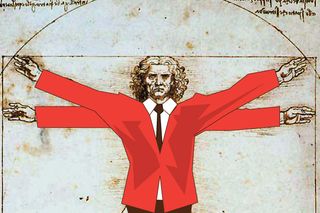
The four-limbed body plan that dominates higher-order animals dates back to the time when lobe-finned fish made the transition to terra firma. They could have just as easily had six fins, and if they had, scientists think life would have stayed low to the ground, and large, intelligent animals might never have evolved. [Get the full explanation]
What if the Neanderthals had not gone extinct?

Neanderthals could have persisted in pockets in Europe even until modern times, and it's possible they would have the capacity to think, speak and act much like us. But experts think it's far more likely they would have been assimilated, interbreeding with humans to create a hybrid species. [Get the full explanation]
Most Popular


